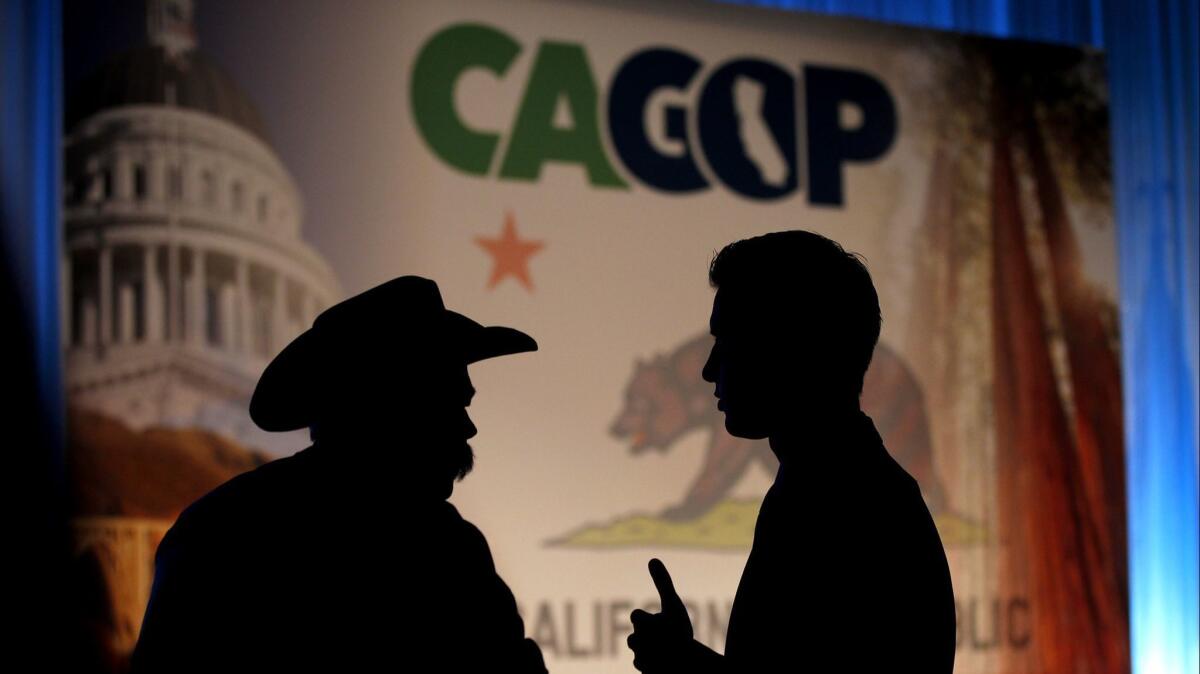Column: For California’s forgotten GOP statewide candidates, it’s a record-setting election for not raising campaign cash

The adage coined by one of California’s most powerful politicians of the 1960s and ’70s, the late Jesse Unruh, still defines modern campaigns. “Money,” the colorful Democrat said, “is the mother’s milk of politics.”
Unruh’s words help explain part of the reason for the anemic state of Republican campaigns this fall for statewide office, especially those “down ticket” from the race for governor. All told, they are the most underfunded group of party hopefuls for those California posts in more than two decades.
In campaign filings late last week, Republicans running for attorney general, secretary of state, treasurer and controller had raised a combined total of $681,485 for the entire year. As of Oct. 20, the four candidates had cash in the bank totaling just $132,036 — less than might be seen in a lackluster campaign for the state Assembly. To make matters even worse, the GOP hopefuls are reporting total debt of more than $196,000.
Records dating to at least the 1990s show no election cycle more lopsided when it comes to campaign cash. (In the marquee race, Lt. Gov. Gavin Newsom has handily outraised and outspent his GOP challenger, John Cox.) In some past elections, only one or two Republican statewide candidates was well-funded — for example, former Insurance Commissioner Chuck Quackenbush in 1998 and L.A. Dist. Atty. Steve Cooley for attorney general in 2010.
But there were always a few races in which the party’s backers would place a bet. This time, it’s a campaign cash wasteland. The most successful fundraiser is Steven Bailey, a former Northern California judge who’s challenging Atty. Gen. Xavier Becerra. And yet half of Bailey’s cash came during the primary when he bested another Republican for the second spot on the November ballot. In just the last month alone, Becerra has raised three times what Bailey has collected since late June.
Mark Meuser, an attorney running for secretary of state, has raised the second-largest amount of the down-ticket Republicans, close to $290,000. The GOP candidates for state treasurer and controller — Greg Conlon and Konstantinos Roditis — have raised so little that they’d probably be outspent in campaigns for city council.
The meager expectations didn’t happen overnight. There have been 48 elections for statewide office since 1994, and Republicans won only 10 of those. Half were in 1994, a high-water mark for Republicans nationwide. But in the intervening years, the state party shrank by 800,000 voters while Democrats added more than 1.1 million members. The ranks of unaffiliated, independent voters more than doubled.
Those swing voters — who Republicans simply cannot win statewide races without — either aren’t seeing the GOP campaigns or have a negative view of Republican leaders. A poll last week by the nonpartisan Public Policy Institute of California found 62% of self-identified moderate likely voters disapproved of President Trump; 81% disapproved of the Republican-led Congress.
“The headwinds are just tremendous,” Mike Murphy, a longtime Republican strategist and now co-chair of the USC Center for the Political Future, said earlier this month.
And in a sign of how hard things have become for the California Republican Party in trying to win one of the eight constitutional offices, it has no candidate in the races for lieutenant governor or state insurance commissioner.
The lieutenant governor’s race is between two Democrats. The insurance commissioner’s race may be an even more bitter pill: The man who won it as a Republican in 2006, Steve Poizner, is now running to reclaim the post as an independent. Though he may still embrace some of the party’s positions, GOP leaders won’t be able to take credit should he win on Nov. 6.
It’s hard for Republicans to win statewide in California if they don’t have candidates »
Follow @johnmyers on Twitter, sign up for our daily Essential Politics newsletter and listen to the weekly California Politics Podcast
More to Read
Get the L.A. Times Politics newsletter
Deeply reported insights into legislation, politics and policy from Sacramento, Washington and beyond. In your inbox three times per week.
You may occasionally receive promotional content from the Los Angeles Times.











